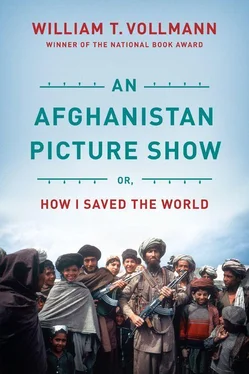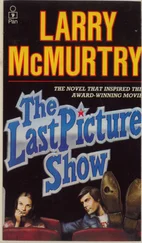“Let’s go,” said Erica. “We’ve got to get across soon. The water’s rising faster.”
“All right.”
“Watch me! Be ready to run for me! Pay attention!”
“All right.”
The water was already up to her hips. As I watched, she staggered and righted herself. Carefully I paid out rope. Then she was across and looking anxiously at me. — “Okay!” she called. “Come on!”
“This doesn’t look too bad,” I said across the channel to her, knowing that she couldn’t hear. I stepped into the water. For the first time that day I allowed myself to look ahead, and saw that the other side of the river was a long distance away. We were less than halfway to it. The bank became a green ridge of tundra that met the horizon, topped by the squat white shape of Mount McKinley thrusting into the blue sky.
“Come on!” Erica called through cupped hands.
I wasn’t frightened anymore. I felt doomed. I started stumbling when the water was only calf-deep. Arms spread wide, I kept on. The current pushed at me rhythmically with each step. The cold water was up to my knees. The only noise I could hear was the gravel churning in the water. My legs were numb. I decided to hurry to get it over with. Paying no attention to my footing, I bolted toward Erica. I looked up at her on that distant sandbar ahead of me; she was pulling in rope complacently. She was pleased, no doubt, that I had finally gotten the knack of river crossings and could perform them with all deliberate speed — when actually, of course, I was rushing through the water in a panic. My pack slammed into my back; I felt relief when I finally fell. The river slugged me, chilly, strong and hateful, and ground me into the rocks. I was shooting downstream, scraping across the rocks as I went. I was breathing in water. I didn’t even try to raise my head. I considered myself dead.
Then I stopped moving with a jerk. Erica had thrown herself down to the ground and began to haul me in. I felt myself being hauled, but I could not help her. Slowly, slowly she dragged me out of the river. I could hear her grunting with the effort. At last I was lying in only three or four inches of icy water. I tried to get up, but I couldn’t. My body was without feeling, and my pack was heavy with water. I undid one shoulder strap, pulled myself slowly out of the other, and dragged myself and my pack very slowly along through the wet stones, as if I were a snail.
“Come on!” Erica was calling. “Get up!”
I tried to keep moving.
“You can do it! You’ve got to do it! Get up!”
Erica called my name again, breathlessly.
…We were on another big sandbar. Erica Bright was pulling off my shoes and my torn, bloody blue jeans; she was unrolling my sleeping bag, which had stayed dry in its double stuff sack; she was holding me tight. My legs and face were bloody. — “Hurry up and get into your bag,” Erica Green-Eyes said. “You have hypothermia.”
“Erica …” I said. It took all my effort to say her name.
“My heart really went out to you, too,” she said. “Now get in.”
For a long time I shivered in the sun. Erica sat beside me all afternoon. — “You know,” she said finally, “I’m starting to get fond of you.”
I smiled up at her.
The next day we crossed the McKinley all the way. In the last channel, Erica fell. We were side by side in the water, holding on to each other by my belt. There was a heavy clank as Erica hit the rocks with her pack, and then a grinding. I was pulled down.
“Get up!” I shouted in my best Green-Eyes manner. I pulled her up; she slipped off her pack. We were in calm, shallow water. I helped her to her feet, and the two of us dragged her pack onto the final sandbank. She looked at me, wet and smiling, and threw her arms around me and kissed my cheek.
Of course, she hadn’t needed my help at all.
THE OTHER SIDE
I will never forget that morning, which was so sunny and joyous, with the river behind us and ahead of us a rolling tundra ridge sparkling with wet blueberries, †beyond which (although we could not see that yet) was a valley of beautiful little lakes in which we could bathe, and then ankle-deep moss, some red, some green; and then more ecstatic days and terrible days until one morning we woke up in someone’s bedroom, she in the double bed, I in my sleeping bag on the floor (for we never slept together), and the shades were down so that the room was so dim that we could hardly see each other; we had woken up at the same time; she reached down from the bed, I reached up, and we gripped each other’s wrists in that solid way that gives support on river crossings, and I have not seen Erica again, but I went back and back to the Arctic and crossed rivers by myself because dear Erica showed me how; and as Erica and I came out of the river on that morning in late July I somehow knew all this and was so happy as we ate blueberries out of Erica’s enamel cup; and of course within hours came the edge of that mossy plateau, and below waited our next river and I could hear the heavy sound of the water, and the river was just as dreadful as ever; but while we were eating blueberries it was a long way away yet; and the place where we found ourselves was so beautiful, so beautiful, and I was stunned by the sunlight and the sound of the river behind me and the unknown vastness ahead of me; I was stunned by it all. — I think now that if my purpose in going to Afghanistan was at all good, then it must have been to learn if there was a way to help people get across rivers — as I said, I didn’t help them, but they helped me. When I went into Afghanistan, my friend Suleiman carried me across the rivers on his back.
* Hangu Camp, 1982.
† When I first read Purgatorio , Canto I, it made me feel this way again.
10. A MATTER OF POLITICS: THE GAME (1982)
We are just concerned with the receiving end of the ammunition and the sorts of facilities to continue our jihad. We are not concerned theoretically with the source, and we are not concerned in this situation to recognize the intention of the donor.
JUDGE DR. NAJIB SAID

A matter of politics
As long as they grow in the wild, principles of life and meaningful action do quite well, but when they are plucked and brought into our dreary world of imperfect results, they begin to wilt. Happily, our noses are so accustomed to the stink of our enemies’ putrefying ideas that when our own give over wilting and commence to decay, we can use them nonetheless. *
The Young Man, however, did not yet know this. As yet he had established only the following:
1. The suffering that besieged him could not be justified. That put him very definitely on the Afghan side.
2. His belief that he might somehow be of use could not be justified.
3. Being victims did not make the Afghans any better or worse than anybody else.
There did not seem much left to do, then, in those days while he waited for the Brigadier’s party to finish its preparations to go inside , but to be analytical. That was all that he was really good at. Everything was melting in his hands. But at least the following must be true: I am on the side of the Afghans; therefore the Resistance has to be wonderful. (In his mind, the Mujahideen were all storybook de Gaulles; too much reading had relegated him far behind even the zero point of simple ignorance.)
“You really want to know about the parties?” laughed General N. “I can take you around, Young Man. It will be very educational for you.”
Читать дальше













